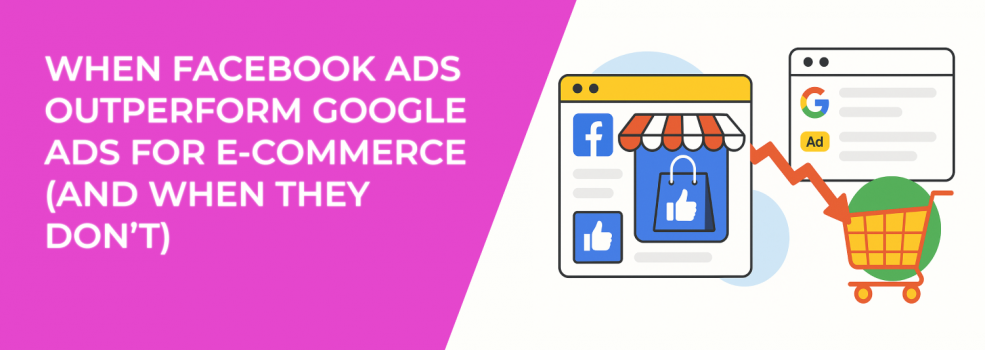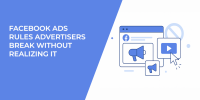E-commerce businesses often face a familiar challenge: which advertising platform works better — Facebook Ads or Google Ads? Both are powerful, but they serve very different purposes. Knowing when to use each can help you avoid wasted ad spend and capture more sales.
This guide breaks down the strengths and weaknesses of both platforms, with examples, use cases, and tips to make smarter decisions for your store.
When Facebook Ads Outperform Google Ads
Facebook is designed for discovery. Users don’t log in to search for products. They scroll to see updates, photos, and videos — which gives advertisers the chance to introduce new products in an engaging way.
Here are situations where Facebook Ads usually perform better for e-commerce:
-
Impulse purchases. Low-cost items like fashion accessories, home décor, or fitness gadgets often succeed here. A well-shot video showing a $25 blender bottle in action can trigger an immediate buy, even if the person wasn’t shopping for it.
-
Lifestyle-driven products. Apparel, beauty, and wellness brands thrive because visuals tell a story. A carousel ad showing outfits styled in different ways works far better on Facebook than in a plain text ad on Google.
-
Scaling fast. Once a product starts converting, you can expand reach with lookalike audiences. For example, a brand selling pet toys can target new dog owners based on interests and behaviors, multiplying results in days. Learn how Facebook ad targeting really works to make sure you know what you're doing.
-
Building brand recognition. Facebook campaigns are effective when you need to introduce your store to a broader audience. Even if people don’t buy immediately, they become familiar with your name and products.
Think of Facebook Ads as the tool for sparking desire. A scroll-stopping creative can take someone from curiosity to checkout in minutes.
When Google Ads Outperform Facebook Ads
Google captures intent. People search when they want answers or solutions, which means ads appear in front of buyers already closer to making a decision.
E-commerce brands often see stronger performance on Google Ads in these cases:
-
Products that solve a clear problem. Someone searching “waterproof hiking boots size 10” is ready to compare prices and buy. Facebook, in contrast, would need to guess interest.
-
High-ticket items. A $1,200 treadmill is rarely an impulse buy. Buyers research and compare before committing, and Google search or Shopping ads give them the information they need.
-
Bottom-of-funnel targeting. If you’re focusing on people ready to purchase, Google often drives higher conversion rates because the intent is strong.
-
Niche or technical products. Specialized items — like 3D printing parts, medical supplies, or industrial tools — do far better on search, since the audience is actively looking.
Google Ads act like a magnet for demand. If someone is already searching for your product, Google ensures they see you before your competitors.
Why Many E-Commerce Stores Start With Facebook Ads
For new or growing stores, Facebook Ads often feel more flexible. You don’t need existing search traffic. Instead, you create demand with visuals and storytelling.
For example:
-
A startup selling eco-friendly phone cases can run a video showing how the material breaks down naturally. Even if no one is searching “biodegradable phone case” yet, Facebook can generate interest.
-
Small brands can test multiple products quickly by running ads against different audiences. Within a week, they’ll see which products attract clicks and sales.
Another strength is retargeting. If someone visits your store and leaves without buying, Facebook allows you to show them ads again. Many e-commerce brands report that retargeting ads deliver the highest ROI of all campaigns. See how to set up Facebook retargeting properly.
The downside? Poor creatives or broad targeting can burn through budgets quickly. Unlike Google, where intent drives the click, Facebook relies on your ability to grab attention.
If you struggle with low conversions, reviewing why Facebook Ads fail to convert can save time and money.
Why Established Brands Lean on Google Ads
Bigger or more established e-commerce businesses often invest heavily in Google Ads. That’s because they already have demand for their products, and Google helps capture it.
Consider these examples:
-
A furniture retailer runs Google Shopping campaigns so buyers see prices, reviews, and shipping details right in the search results. This reduces friction and brings in qualified leads.
-
A premium skincare brand uses branded search ads to prevent competitors from bidding on their name. Even if shoppers search the brand directly, competitors can appear unless you secure that space.
Google’s consistency is another draw. Search volume doesn’t fluctuate as wildly as social media engagement, so performance tends to be more predictable.
Balancing Facebook Ads and Google Ads
The best strategy isn’t choosing one over the other. It’s understanding how they complement each other across the customer journey.
Here’s a simple way to think about it:
-
Use Facebook Ads for discovery, storytelling, and retargeting.
-
Use Google Ads for intent-driven searches, high-value products, and protecting brand traffic.
-
Track results separately by funnel stage — awareness, consideration, and purchase — instead of looking at one overall ROI.
When planning campaigns, make sure your ad objectives align with your goals. A wrong choice in Meta Ads Manager can sink performance, no matter how strong the targeting is. This guide on Meta campaign objectives shows how to match them to business outcomes.
For example, you could run Facebook campaigns to introduce a new clothing line, retarget visitors who browse but don’t buy, and then rely on Google Ads to capture buyers searching “best affordable men’s jackets.”
Together, the platforms cover both sides of the buying process — desire and intent.
Final Thoughts
Facebook Ads outperform Google Ads when you need reach, discovery, and visual storytelling. Google Ads outperform Facebook Ads when you’re chasing buyers who already know what they want.
The real advantage comes when you use both strategically. Facebook brings people into the funnel. Google helps close the sale.
The question isn’t which is universally better — it’s which is better for your product, your audience, and your stage of growth.

